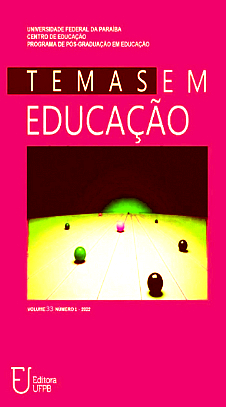Apresentação do Dossiê:
Quais Juventudes Querem Os Currículos? Quais Currículos Querem A Juventudes?
DOI:
https://doi.org/10.22478/ufpb.2359-7003.2024v33n1.70200Keywords:
Currículos, Juventudes, QuereresAbstract
Apresentação do Dossiê organizado por Danilo Araujo Oliveira (UFMA), Luiza Cristina Silva (UFAL) e Shirlei Sales (UFMG) junto aos editores Marlécio Maknamara (UFPB) e Fabiana Sena (UFPB).
Downloads
References
BARÃO, M. et al. Vozes das Juventudes. Atlas das Juventudes, 2021.
CORAZZA, Sandra. O que quer um currículo? Pesquisas pós-críticas em Educação. Ed. Vozes, Petrópolis, Rio de Janeiro, 2001.
CORROCHANO, Maria Carla; et al. Jovens e trabalho no Brasil: desigualdades e desafios para as políticas públicas. São Paulo: Ação Educativa, Instituto ibi, 2008.
DAYRELL, Juarez. O Jovem como sujeito social. Revista Brasileira de Educação, 24, 40-52. 2003.
MAKNAMARA, Marlécio. Quando artefatos culturais fazem-se currículo e produzem sujeitos. Reflexão e Ação, 28(2), 58-72, 2020. https://doi.org/10.17058/rea.v28i2.14189
SILVA, Tomaz Tadeu da. Documentos de Identidade: uma introdução às teorias de currículo. Belo Horizonte: Autêntica. 1999.
Downloads
Published
How to Cite
Issue
Section
License
Copyright (c) 2024 Revista Temas em Educação

This work is licensed under a Creative Commons Attribution 4.0 International License.
Authors who publish in this journal agree to the following terms:
. Authors retain the copyright and grant the journal the right to first publication, with the work simultaneously licensed under the Licença Creative Commons Attribution that allows the sharing of the work with acknowledgment of authorship and initial publication in this magazine. . Authors are authorized to assume additional contracts separately, for non-exclusive distribution of the version of the work published in this journal (eg, publishing in institutional repository or as a book chapter), with acknowledgment of authorship and initial publication in this journal.
. Authors are permitted and encouraged to publish and distribute their work online (eg in institutional repositories or on their personal page) at any point before or during the editorial process, as this can generate productive changes, as well as increase impact and citation of the published work (See O Efeito do Acesso Livre).



















